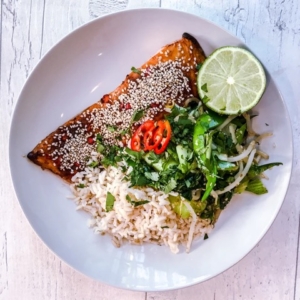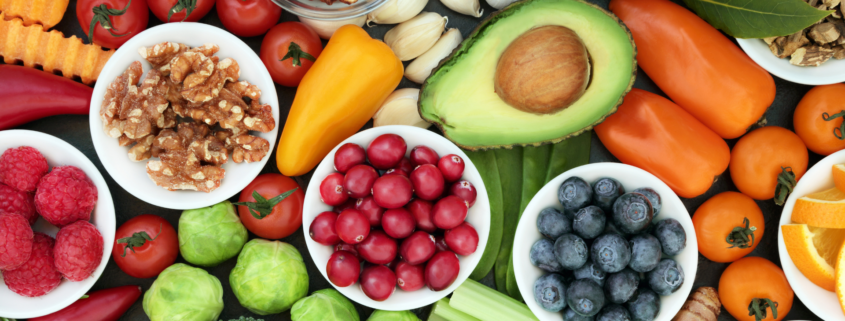The important link between Stress and Nutrition
Most of us will have experienced stress in some shape or form throughout our lives and it has become one of the major underlying causes of chronic health problems in the Western world.
Whilst a little stress can be useful and act as a motivator it becomes a problem when stress is extreme or ongoing as it can create imbalances in the body, depleting valuable nutrient reserves which can lead to health problems.
Medical research now shows a clear link between the diet and mental health and specifically the role of nutrition in depression. Read on to find our why nutrition is important for mental health, which nutrients can support it, which foods to avoid and how the gut brain axis can have an impact.
Why is nutrition important for mental health?
The right nutrition can have a dramatic impact on your ability to cope with stress. Food plays a key role and it is vital to look at the diet and consider whether there are any deficiencies that may be contributing to development of mood imbalances.
A healthy diet of nutrient dense foods will help to keep your body and mind healthy, this includes A diet of ‘whole’ food with plenty of fresh fruit and vegetables and good fats.
Key nutrients that can help to support our mental health
Magnesium
Magnesium helps to calm the nervous system and regulate the stress response as well as relaxing the mind and is known as ‘nature’s tranquiliser’ Magnesium is the cofactor for the production of GABA, a neurotransmitter which relaxes the central nervous system and yet worryingly, is also one of the most deficient in most people. Inadequate intake of magnesium has been linked to sleep disorders and sleep is vital for our mental health.
Good sources: dark leafy greens, nuts & seeds (pumpkin seeds)
B vitamins
Known as the stress vitamins as they can help to balance the nervous system especially Vitamin B6. Vitamin B6 is an important co-factor in several of the biochemical pathways in the adrenal stress response and so helps to support the nervous system (particularly mood swings). Vitamin B6 helps to relieve stress, yet stress depletes this vitamin so it is vital to have plentiful levels of this nutrient during stressful periods.
Good sources: Whole grains, red meat, poultry, fish, eggs and dairy products, legumes (beans, lentils), nuts and seeds, dark, leafy vegetables (broccoli, spinach)
Vitamin C
Vitamin C is commonly used in large quantities in times of stress as it supports adrenal health. Humans cannot make vitamin C so it important to have high quantities during stressful times to cope with increased demand.
Good sources: Citrus fruits, kiwi, peppers, strawberries, tomatoes, broccoli, kale
Amino acids
These are the feel-good neurotransmitters. Serotonin and Dopamine are both well known to make us feel good and they are made up of amino acids. The specific amino acids which make them up are called Taurine and Theanine and they play an important role in the brain and nervous system.
Good sources: turkey, chicken, whole grains, beans, rice, lentils, cottage cheese, bananas, eggs, almonds, walnuts, pumpkin seeds.
Healthy fats:
The nerve cells in the body are made up of fat and these fats facilitate neuron-to-neuron communication and help to build healthy brain cell membranes, staving off anxiety. Fish oils are also crucial for development and function of the brain and nervous system and as the brain is incredibly sensitive to inflammation, it needs a constant supply of anti-inflammatory omega 3 fats in order to protect it.
Good sources: Oily fish, such as salmon, sardines, mackerel. Vegetarians can get their good fats from avocado, walnuts, chia seeds and seaweed.
Foods to avoid
- Alcohol
- Caffeine
- Nicotine
- Sugary drinks
- Sugary snacks
All of the above are called stimulants. These can be used to help in times of stress but they will deplete the body of nutrients, making things worse and reducing the support all of the above nutrients offer. Alcohol is also depressant and can lower your mood furthermore.
The Gut-brain axis
Our body is full of microorganisms called microbiome and many different types can be found in our gut. Stress can alter the microbiome in our gut but the microbiome can also alter the way in which our bodies respond to stress.
Research is increasingly demonstrating that the digestive system influences the brain and vice versa. In recent years, research has shown strong links between bacterial imbalances in the gut and imbalances in brain chemistry specifically linking to mental disorders such as anxiety. Therefore, the health of the gut has to be of paramount importance especially when looking at one’s mental health.
So what happens in the gut? 90% of the body’s serotonin, also known as the happy neurotransmitter is produced in the gut. When we are feeling stressed and anxious this can lead to increased levels of a hormone called Cortisol, also known as the stress hormone which can have an effect on the balance of good bacteria in the gut. When the balance of bacteria is our gut is off this can negatively impact the production of serotonin, causing a lower mood.
Tips for maintaining a healthy gut
- Eat the rainbow
Eat lots of different coloured vegetables and fruit as the different polyphenols (plant compounds) have been shown to enhance the growth of beneficial bacteria and promote gut health. - Eat fermented foods every day
Including fermented foods in our diet enhances the health of the gut by eating these live bacteria. These include natural yoghurt or kefir, sauerkraut, miso, kimchi and kombucha. - Prebiotic foods
Prebiotics are fibers that help to ‘feed’ beneficial bacteria in the gut. You can find prebiotics in apples, bananas, cauliflower, garlic, onions, leeks and oats.
Recipe inspiration to keep that gut healthy!
Teriyaki Salmon
A really popular reci pe and a nutritious meal providing you with essential omega-3 fatty acids EPA and DHA which are not made by the human body, so we need to include them in our diet.
pe and a nutritious meal providing you with essential omega-3 fatty acids EPA and DHA which are not made by the human body, so we need to include them in our diet.
These healthy fats are vital for our well-being, brain function, metabolism and hormone regulation. This is really quick and easy to prepare and also very, very tasty.
Find the full recipe on Alex’s website here:
https://www.nutritionforlife.co.uk/post/teriyaki-salmon
Chickpea and coconut curry
A really popular dish bursting with goodness and flavour.
Chickpeas are highly nutritious providing a good source of protein and B-vitamins.
Find the full recipe on Alex’s website here:
https://www.nutritionforlife.co.uk/post/chickpea-and-coconut-curry
















